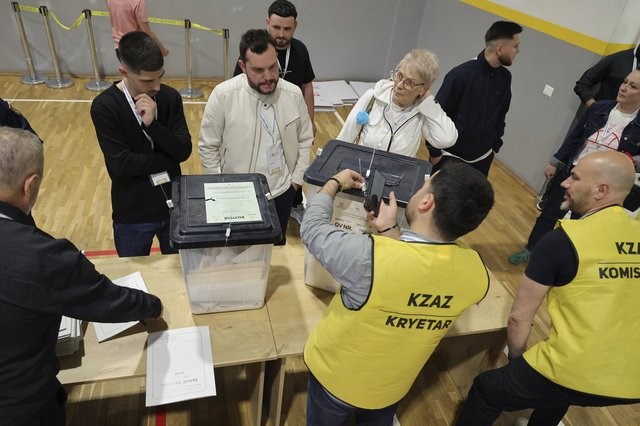
Ballot boxes are checked following the end of the voting procedure in Albania's parliamentary election after a boisterous campaign dominated by the country's uphill effort to join the European Union and Prime Minister Edi Rama's bid for a fourth term, in Tirana, Albania, Sunday, May 11, 2025. (AP Photo/Vlasov Sulaj)
Republished May 12, 2025 - 8:26 AM
Original Publication Date May 11, 2025 - 10:56 PM
TIRANA, Albania (AP) — Preliminary results in Albania’s parliamentary election on Monday showed the ruling Socialist Party ahead, with voters supporting the country’s uphill effort to join the European Union and Prime Minister Edi Rama’s bid for a fourth term.
With more than half of the votes counted, Rama's left-wing Socialists got 53% of the votes, followed by the opposition center-right Democratic Party-led coalition of Sali Berisha with 34%. Three other small parties will take a few seats.
With those numbers, the Socialists are likely to get the required 71 seats to govern alone and likely even more than the previous mandate.
Preliminary turnout Sunday was almost 42.16%, or 4% lower than four years ago.
Eligible voters in Albania and abroad voted to elect 140 lawmakers for a four-year mandate in the Balkan nation. Because of mass emigration, the country of 2.8 million people has a total of nearly 3.7 million eligible voters. For the first time, those in the diaspora could vote and cast their ballots by mail. About 191,000 mailed in their votes.
Ilirjan Celibashi, the head of the Central Election Commission, said that Sunday's vote was largely peaceful, with some irregularities involving candidates and some of their supporters that would not negatively impact the results.
“For the most part, excluding some sporadic cases, the process has been in line with the rules and standards,” he said Sunday evening after the voting ended.
Still, a joint observation mission from the Organization for Security and Cooperation in Europe’s Office for Democratic Institutions and Human Rights, the OSCE’s Parliamentary Assembly, the Parliamentary Assembly of the Council of Europe (PACE), and the European Parliament urged “the need … for comprehensive electoral reform” in Albania, adding that democratic reform and European integration go hand in hand.
They noted that despite being competitive and professionally managed, the election process so far was marked by the ruling party's misuse of public resources, a confrontational and polarizing tone, the two main political parties using divisive language, untransparent financing, and unbalanced media coverage of smaller parties.
Out of some 570 international observers, 365 belong to these institutions, highlighting the international community’s stake in ensuring Albania has a credible and transparent election.
“The high interest displayed by Members of Parliament from so many countries in these elections is a manifestation of how much we care for Albania, for its people and for its future,” said Farah Karimi, special coordinator of the observers.
Rama’s Socialist Party says it can deliver EU membership in five years — end the negotiations until 2027 and wait for approval from each of the EU’s 27 member countries until 2030 — which is an ambitious pledge while battling conservative opponents with public recriminations and competing promises of pay hikes.
Rama, 60, who secured the start of EU membership negotiations in October, highlighted achievements in infrastructure and justice reform in his campaign.
The Socialists say they will accelerate a tourism boom and increase foreign visitors from 10 million arrivals in 2024 to 30 million by 2030, by diversifying destinations through the expansion of infrastructure projects. Rama has also pledged pension and pay hikes.
Rama’s main challenger is Sali Berisha, 80, a former president and prime minister, who argues that Albania still isn’t ready for EU membership.
Berisha held an electoral campaign resembling that of U.S. President Donald Trump, also hiring one of his top campaign consultants.
News from © The Associated Press, 2025